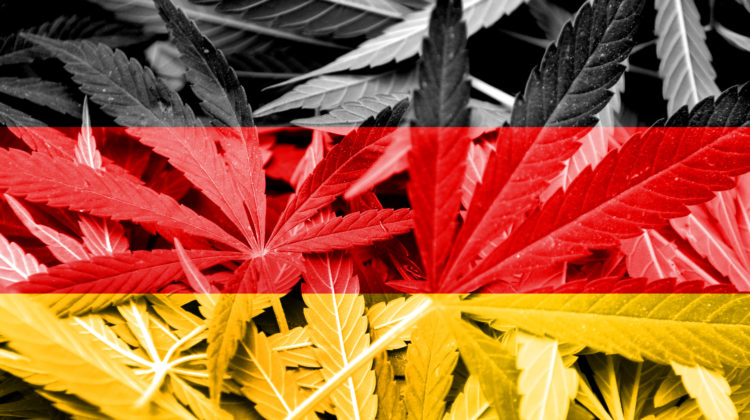
Photo credit: Lukasz Stefanski.
Seven months after Germany legalized adult-use cannabis, the country’s so-called “cannabis clubs” finally distributed cannabis for the first time to its members last Saturday.
At midnight on April 1, Germany’s Cannabis Act (Cannabisgesetz or CanG) entered into force. The legislation legalized the recreational use of cannabis in the European Union’s (EU) most populated country. The law allows for adults aged 18 and above to purchase or grow cannabis. Adults can buy up to 25 grams per day, with a maximum of 50 grams per month. While those between 18 and 21 years old can have up to 30 grams per month.
Since July 1, adults who do not want to grow their own plants can join “cannabis clubs.” The clubs can have up to 500 members and grow and distribute cannabis to its members. Recreational cannabis will remain banned for under-18s and within 100 meters of schools, kindergartens, and playgrounds.
Part of the CanG is to remove cannabis from Germany’s Narcotics List. This is one of the biggest breakthroughs of the law, essentially regulating medical cannabis like ibuprofen, Benzinga reports.
The country legalized cannabis for medical use in 2017. Patients can have access to medical cannabis for serious illnesses only when a physician prescribes it.
Currently, Germany is the third EU country to legalize cannabis for recreational use after Malta and Luxembourg, and the ninth country to do so globally. In other European countries, like the Netherlands, cannabis is not technically legal but decriminalized, according to Courthouse News.
“The cannabis policy in the last 10 years has failed,” Karl Lauterbach, Germany’s Health Minister said in a press conference. “We have seen a doubling of consumption, especially among children and adolescents, … the black market is getting bigger and bigger, the number of drug-related deaths has doubled in the last 10 years. It could not go on like this.”
In a recent study by Deutsches Ärzteblatt International, there were higher rates of cannabis usage among 14–24-year-olds at 11.4% than those aged between 25 and 39 years old at 8.2%.
A Boost to the Medical Market
The legislation will further benefit the country’s already thriving medical cannabis market.
By 2024, Germany is may see a projected revenue of more than $499 million in the medical cannabis market. The growth rate of the market is to be 3.54% between 2024 and 2029, leading to a volume market of over $594 million.
Patients in Germany also no longer need to go through a lengthy process to attain their medication. That’s because medical cannabis is no longer on the country’s Narcotics List. Cannabis can now be prescribed as standard prescriptions, reports MJBizDaily. This means it no longer requires a narcotic prescription form.
After the enactment of CanG, patients in Germany can now get medical cannabis through an entirely digitized journey, according to Rolling Stone. The first session with a doctor can take place online. Additionally, a physical prescription is no longer required—a doctor-prescribed e-receipts is sufficient
“That simplifies things for doctors, but also for the supply chain,” Alfredo Pascual, executive director at Seed Innovations, a medical cannabis investment company, told MJBizDaily. “That means it’s going to be easier to prescribe cannabis.”
“Immense Potential”
Bloomwell Group Gmbh, a Frankfurt-based medical cannabis company, released a survey in which 94% of its respondents reported using cannabis at least for one health reason. Stress relief was the most common health reason at 60%. This was followed by sleeping disorder at 50.4% and pain relief at 35%.
Prior to April 1, Germany had an estimated 200,000-300,000 active medical cannabis patients. But that number may increase to five million, Rolling Stone reports.
“The responses illustrate the immense potential and room for growth of the country’s rapidly expanding medical cannabis industry following the implementation of the [CanG] on April 1, 2024, which rescheduled cannabis as a non-narcotic,” Niklas Kouparanis, co-founder and CEO of the Bloomwell Group, the holding company for Bloomwell Gmbh, said in a statement. “According to the data from our survey, more than 20 million people in Germany could benefit from access to medical cannabis therapy.”
Moreover, experts expect legalization to bring $5.1 billion from the taxes of cannabis products sold in the country. This includes from tourists coming to Germany for cannabis. It also factors in the money courts and law enforcement will save by not prosecuting cannabis cases, according to Harris Sliwoski, a legal firm that specializes in the cannabis industry.
Germany Aligns with International Norms
By removing cannabis from its Narcotics List, Germany’s modernization effort so far is on par with international norms.
Recognizing cannabis’ medicinal properties, the United Nations removed it from a list of the most dangerous drugs in 2020. Twenty-seven of the 53 Member States of the Commission on Narcotic Drugs (CND) voted in favor of the removal.
Initially, the 1961 Single Convention on Narcotic Drugs put cannabis in Schedule 4 alongside opioids, including heroin. It was deemed deadly with little to no therapeutic purposes. Cannabis is now listed as Schedule 1 substance with the UN Single Convention.
Though the UN still deems cannabis a controlled substance, the decision is expected to soften restrictions on cannabis research for therapeutic use.


Leave a Reply